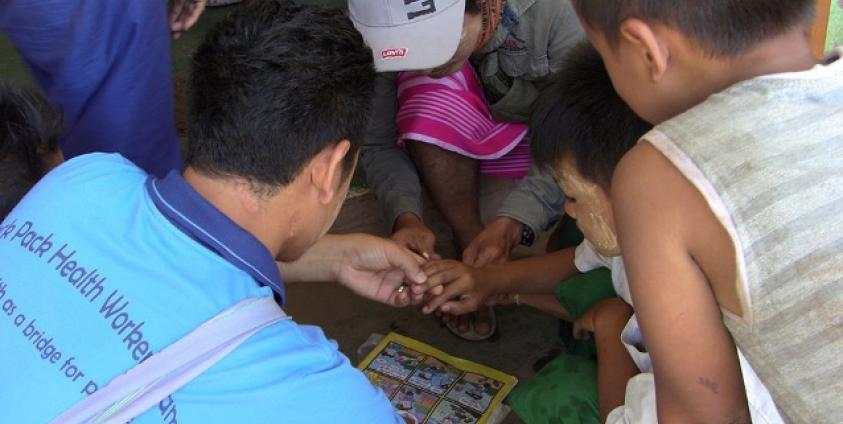The Back Pack Health Worker Team (BPHWT) has emphasized the urgent need for cross-border assistance and humanitarian aid to the 2 million internally displaced persons (IDPs) throughout Myanmar forced to flee from the Junta’s terror campaign of aerial bombardment.
This statement was issued following the ninth conference of the paramedic NGO “The Back Pack Health Worker Team” (BPHWT), held from May 29 to June 2 at a location along the Thai-Myanmar border.
BPHWT Secretary Saw Win Kyaw highlighted the huge obstacles in safely delivering aid after the coup, stating that, “BPHWT and other aid organizations take precautions to prevent health supplies intended for IDPs from reaching the Military Council. Instead, providing assistance through border crossings is considered a more viable and effective approach.”
"We must exercise caution in our approach to providing local aid. Navigating through forest roads poses challenges, particularly when crossing rivers where cars cannot reach. Therefore, it would be beneficial to seek assistance from neighboring countries like Thailand, India, Bangladesh, or China to provide the most effective support."
Saw Win Kyaw added that BPHWT currently imports most of the medicine and supplies from Thailand, but there are difficulties when negotiating with the Thai authorities.
Last month the KNU and NGOs delivered a letter to Indonesian President and current chairmanof Asean to explain the failure of humanitarian aid delivery inside Myanmar. The letter read: “ It will not be feasible for the AHA Centre (The Asean arm of humanitarian aid) or any of the humanitarian aid deliverers to reach the vast majority of Myanmar civilians in need, without the involvement and cooperation of the EROs [ethnic resistance organizations], and NUG-affiliates on the ground."
This proposal, spearheaded by the NUG and three key ethnic resistance groups, had been discussed on the sidelines of an ASEAN summit in Indonesia that wrapped up on May11th There is so far no feedback to suggest this attempt to convey some on the ground reality of the Myanmar situation, has made any great difference to the Asean’s narrow perspective.
Following the coup in Myanmar, the country has witnessed approximately 2 million internally displaced persons (IDPs), whose livelihoods and lives are severely impacted by the security threats posed by the Military Council.
The BPHWT statement further highlights that the health system has deteriorated due to the gross inadequate management of the Military Council exacerbating the challenges faced by the population in accessing essential healthcare services.
Regarding the lack of health systems in the IDPs' areas, Saw Win Kyaw said, "Numerous healthcare workers were filled with fear and forced to flee as the military's airstrikes and artillery shells ravaged medical facilities. Consequently, there is a severe shortage of doctors in clinics located within war-torn areas. Our dedicated teams are working tirelessly to provide assistance, yet the demand for medical care remains unmet and continues to persist."
The statement also highlights the commitment of BPHWT to advancing a health system based on the principles of a federal democracy. They emphasize the importance of coordination with all sectors, including ethnic health groups, and will make concerted efforts to achieve long-term and sustainable development of the health system, while ensuring equitable access to basic healthcare opportunities.
During the recently conducted BPHWT conference, the organization's financial report and work report were presented and extensively discussed. The attendees reviewed and approved the processes, structure, and procedures that will be implemented. Moreover, a leadership team consisting of 11 members was elected, with Dr. Cynthia Maung as the chairperson.
The Back Pack Health Worker Team (BPHWT) was formed on August 16, 1998, with the purpose of providing basic health services in war-torn ethnic areas. Operating with 32 small backpack teams, they commenced primary healthcare initiatives in remote regions of Karen, Karenni, and Mon, serving communities in need.
According to the spokesperson of the team, BPHWT currently has over 560 health workers engaged in healthcare activities. Among the more than 100 clinics established nationwide, 66 are specifically located in indigenous areas of Karen State.
The BPHWT statement surprisingly does not acknowledge that many doctors, nurses and other health workers from the CDM movement ,who fled from hospitals and clinics in urban areas under military control, are now working in war-torn areas and especially in different sectors of KNU jurisdiction. There numbers are estimated to be several thousand, although the exact number is not known.








